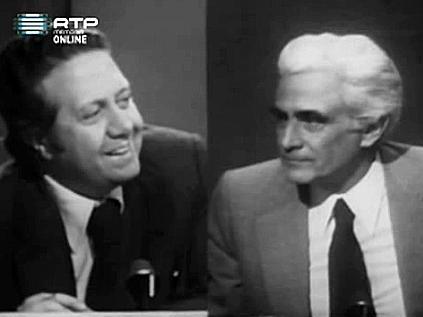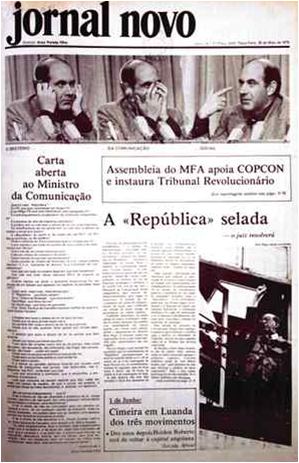PS e PCP sit at the table
On 6 November 1975, in what is the first televised debate in the post-revolution , the leader of the Socialist Party, Mario Soares, and the Communist Party leader Álvaro Cunhal face up and confront projects and ideologies on a collision course. But... "Look, it isn’t so, look, it isn’t so!"
A lit cigarette opens RTP’s broadcast on the 6th of November, 1975. José Megre welcomes the viewers to the first debate televised live for the entire country. On one side, Mário Soares, general secretary of Partido Socialista; on the other side, Álvaro Cunhal, general secretary of Partido Comunista Português.
The debate would make History on Portuguese television, not only for being the first one, but also because of its length. For three and a half hours, Joaquim Letria and José Megre moderated the talk on the TV show Responder ao País. A format that would be impossible to repeat nowadays.
The two personalities of national politics discussed the great topics of the time, including Movimento das Forças Armadas (Movement of the Armed Forces), the workers’ protests, the nationalization of the Media, decolonization and even the socialist ideology.
But the exchange got heated pretty quickly. What started as simple questions from the journalists escalated to a verbal battle. When Mário Soares accused his opponent of wanting to install a dictatorship in Portugal, the answer “olha que não, olhe que não!” (“look, it isn’t so, look, it isn’t so!”) would be forever remember by the Portuguese – and leave its mark in the Portuguese political vocabulary.
The studio and the tables did little to improve the aesthetics of the background, and the political speeches lacked brilliance – and soundbites.
THE AFTERMATH OF VERÃO QUENTE (HEATED SUMMER)
The context? The so-called “Verão Quente” (“Heated Summer”) of 1975 had just ended, at a time when society was radicalised between left and right. In the aftermath of the revolution on the 25th of April, Portugal lived a troubled political moment, marked by successive interim governments and streets in ongoing turmoil.
It all started on the 11th of March, 1975, when parachuting troops linked to general Spínola attacked Regimento de Artilharia Ligeira (RAL1), in Lisbon.
The goal? To stop the operation “Matança da Páscoa”, an alleged far left wing coup in Portugal.
After a few hours of tensions which caused a dead soldier, Spínola’s coup would fail, leading him o exile. The most heated summer in the history of Portuguese politics was about to start.
The plot thickens. In Alentejo and Ribatejo, the big lands are occupied and the large companies are at the ends of work commissions. Banks, insurances and transportation services are nationalised.
On the 25th of April, 1975, PS wins the elections for Assembleia Constituinte, with 37,8% of the votes, while PCP only reaches 12,4%. On the 1st of May, PCP prevents Mário Soares and the PS delegation to reach the tribune in Estádio 1.º de Maio.
MEDIA INSTABILITY
Rádio Renascença, which had been the target of many strikes and debates about its concession, it’s occupied by the workers. On the 19th of May, “República” case starts: the administration of Repúblicais accused of trying to turn the newspaper into an outlet linked to PS.
The facilities are occupied and, on the outside, PS organises a demonstration, showing support to the former administration. Concentration rises and tensions can be felt.
Anthems are sung and words of order are uttered against the “occupiers” of the building, against PCP, against Álvaro Cunhal and against MFA. The newspaper is closed for good.
PS leaves the government, joined soon after by PPD/PSD, causing the fall of IV Governo Provisório (IV Interim Government) on the 17tg of July, 1975.
Two days later, PS organizes the Fonte Luminosa rally, what became one of Soares’ toughest speeches against PCP.
On the 8th of August, the V Interim Government is born, the las tone led by Vasco Gonçalves. The period that would become undoubtedly known as “gonçalvismo” became another important mark.
Diário de Notícias’ administration is altered and Luís de Barros is named director and José Saramago assistant-director of the newspaper. A number of journalisms question the ideological orientation of a newspaper that was supposedly being manipulated in favor of Partido Comunista Português.
The administration was, then, handed a petition which defended the revision of the editorial orientation and demands its publication. One day later, the document was published by Expresso and had been sent to BBC. This action would result in the suspension of 24 journalists, which would become forever known as “saneamento dos 24” (“riddance of the 24”).
NATIONAL INSTABILITY
The country was split in two. There are numerous attacks to PCP head offices and divisions in MFA lead to the foundation of Grupo dos Nove (Group of the Nine), led by Melo Antunes.
Jornal Novo’s headline announces: “Melo Antunes Document. The non-radical group proposes an alternative for the political crisis”. The most moderated wing of Movimento das Forças Armadas was created.
On the 2nd of September, the assembly of army delegates rejected the appointment made by the President of the Republic, Francisco Costa Gomes, of Vasco Gonçalves as Chefe de Estado-Maior General das Forças Armadas (CEMGFA – General of the Armed Forces Chief of State). Vasco Gonçalves ends up being removed from power.
Later on, on the 19th of September, 1975, the VI Interim Government, led by Pinheiro de Azevedo, takes office.
On the 29th of September, in an “emergency measure” taken by the Government, the studios of a number of radios and RTP were occupied in an attempt to avoid the “state of emergency” in the country.
However, difficulties with the Media would still arise later, when the newsroom of the newspaper O Século starts an ideological debate.
Two groups oppose each other: one linked to Partido Comunista Português (PCP) and the other to Movimento Reorganizativo do Partido do Proletariado (MRPP), which ends up in an internal referendum, which decided the dismissal of the director Adelino Tavares da Silva and deputy head Joaquim Benite.
The decision doesn’t please a lot of people and ends up leading to the departure of sixteen members of that outlet.
SMOKE AND KIDNAPPING
Tensions were far from over. On the 9th of November, a demonstration of support to the VI Interim Government, promoted by Partido Popular Democrático (PPD) and by Partido Socialista (PS) at Terreiro do Paço, in Lisbon.
The explosion of tear gas that was felt in the middle of the protest caused panic and led to the famous sentenced uttered by Pinheiro de Azevedo: “There’s no danger. People are calm, listen. It’s only smoke”.
The next day, construction industry workers started a strike and got together next to Assembleia Constituinte. The protesters, who aimed to pressure the Government until a favorable deal was accepted, didn’t allow for the deputies to leave the building.
The most famous siege in the History of Portuguese politics had begun.
Only in the early hours of the 14th did the union leaders and Pinheiro de Azevedo reach an agreement. The Prime Minister compromised to enforce the Contrato Coletivo de Trabalho (Collective Contract of Work) from the 27th of November on.
People would remember Pinheiro de Azevedo’s words while leaving the Assembly: “I don’t like to be kidnapped, it’s something that bothers me”.
The controversial events of the summer would last until November, namely the 25th of November, when Grupo dos Nove dictated their supremacy.
When they heard that a possible military coup by the far left wing could be in the works, Grupo dos Nove decides to prepare a military intervention, putting an end to the influence of the radical political forces and allowing the establishment of a politically plural and constitutionally based on a semi-presidential regime democracy.
PREC (Processo Revolucionário em Curso – Revolucionary Process in Course) would become Constitutional Process in Course.





